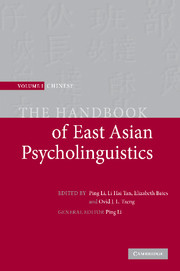Introduction: new frontiers in Chinese psycholinguistics
Published online by Cambridge University Press: 05 June 2012
Summary
A large body of knowledge has accumulated, especially in the last three decades, on the cognitive processes and brain mechanisms underlying language use, language acquisition, and language disorders. Much of this knowledge has come from studies of Indo-European languages, in particular, English. This is no surprise, given the long tradition of scholarly work in these languages and the linguistic and psycholinguistic theories that are produced therein. Some researchers believe that because of the universal principles of language, theories of language and language processing should apply in the same way to all languages even if they are built on facts from specific languages. This universality perspective, reflected most clearly in Chomsky's theories of language, has dominated much of linguistics and psycholinguistics for the last fifty years. Others, however, think that language-specific variations are sufficiently strong to warrant different conceptualizations of linguistic principles and cognitive underpinnings for different languages. Unlike generative theories of language, this second perspective itself is a mixed bag, from the strongest form of the Sapir–Whorf hypothesis that argues for linguistic determinism to modern-day psycholinguistic theories that emphasize language variation and competition. The tension between these two perspectives has yielded much debate in the cognitive and psycholinguistic studies of language, and it is against this backdrop that we see a surge of research interest in recent years in the study of non-Indo-European languages. Our handbook provides a timely synthesis of the debates emerging out of this research interest, in particular, of the psycholinguistic study of the Chinese language.
- Type
- Chapter
- Information
- The Handbook of East Asian Psycholinguistics , pp. 1 - 10Publisher: Cambridge University PressPrint publication year: 2006
- 4
- Cited by



